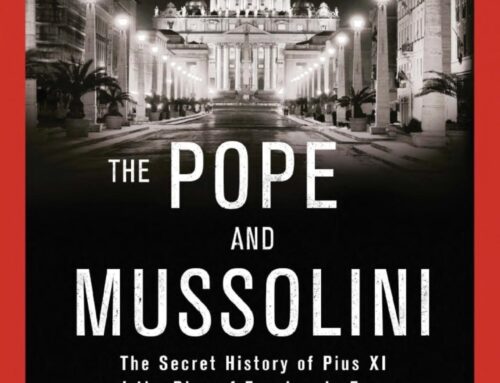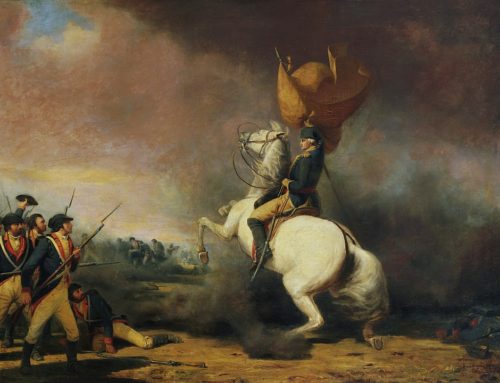By James Lacey
“World War II challenged Americans to rise to greatness. . . . Roosevelt led the way and stood at the pinnacle of events.”
–President Roosevelt before the joint session of Congress on Dec 8, 1941
Introduction
Because I have “writer’s block” that is preventing me from writing an economic article for the Herald Tribune this Tuesday, I decided to use the time productively reviewing James Lacey’s book, The American War. I cannot in good conscience recommend this book despite its erudite discussions of the political infighting that surrounded both military and economic decisions from the late 1930’s until 1945. My circumspection is that Lacey provides needless details that would test the patience of most readers. Lacey garnered my attention because (1) I am addicted to events surrounding World War II and (2) like many of you I am quarantined. In my case, I am quarantined in my apartment in Sarasota. (At the moment 20% of Americans are in lockdown). Now that Sarasota has closed their restaurants, I face a life of staying in my apartment building, only venturing out to Morton’s, our gourmet grocery store. Even worse, much of my daytime is spent watching Business news. Watching the business news is a euphemism for witnessing the meltdown of the global economy and the attendant declines in the stock market.
Review of The Washing War
Lacey discussed in detail the “political partisanship” that surrounded key military and economic decisions. It was fought with intensity and with an impact as critical as outcomes on distant battlefields. Despite a surface appearance of chaos, “titanic rows almost always led to better outcomes than would have prevailed had there been a single man or apparatus dictating events.” Their central figure was President Franklin D. Roosevelt, “a master manipulator who generated results via conflict and always resisted delegating ultimate authority.” In the end, Mr. Lacey argues in “The Washington War,” such conflict vindicated American democracy and sealed Roosevelt’s claim to greatness.
We need to remember that FDR won two wars during his 13 years as president. That is, his policies defeated the Great Depression and defeated the Axis Powers. Unquestionably, America was the arsenal of democracy that provided substantial military assistance to our allies–Great Britain, Soviet Union, and China.
Military Story
Marshall King Stimson Knox Arnold
In a nutshell FDR selected first-rate military leaders and made all the right big decisions. Moreover, unlike Churchill, Stalin, and Hitler, FDR did not get involved in the minutia of military planning. Instead, he focused on important issues such as
Providing substantial military aid to both Great Britain and the Soviet Union. In allocating huge amount of arsenal to Great Britain and the Soviet Union, FDR overcame the advice of his key military advisors who felt that all of our production should remain with our military. They fretted that both Great Britain and the Soviet Union would be defeated and our armaments would fall into the hands of Nazi Germany. Also, resentment against Godless communism was widely held at the highest levels of our political and military establishment. They were not inclined to “sup with the Devil” to defeat Hitler.
Prioritizing defeating Germany over Japan. After Pearl Harbor, most Americans preferred defeating Japan. Roosevelt recognized that Germany offered a far greater threat to civilization. But a lot of dissent had come before this momentous decision. There was, Mr. Lacey notes, an “inevitable clash between Roosevelt and his Joint Chiefs,” who demanded that FDR take one of two steps both of which would have been disasters. In the first case, our military chiefs wanted us to invade France in 1942 or 1943. Such a course of action would have been a disaster because we had green troops, insufficient dominance over the air, and lacked sufficient landing gear. The other mistake would have been to listen to Gen. George Marshall, the chief of staff, “ who strongly asserted that the United States forsake major operations in Europe in favor of an all-out offensive in the Pacific.” Any delay in defeating Hitler would have compromised the future of Europe. In all likelihood, a peace agreement between the Soviet Union and Hitler would have resulted. Alternatively, a Soviet Union victory would have allowed the Red Army to possess all of Europe.
But it was not to be, because FDR agreed with Churchill that we must keep focus on Germany. At the Arcadia Conference, Marshall did succeed in pushing for a U.S.-British unified command centered in Washington DC. Again, it was fortunate that Marshall had a fantastic relationship with his British Counterpart, Sir. John Dill. (Dill is the only non-American buried in Arlington Cemetery). Ultimately, in a victory for Churchill, we launched Operation Torch–the invasion of North Africa.
FDR chose 5 outstanding military leaders: Henry Stimson, Secretary of War; Frank Knox, Secretary of the Navy; George Marshall, U.S. Army Chief of Staff; Ernie King, Chief of Naval Operations; Henry (Hap) Arnold, General of the Air Force. While all five of these men had vastly different temperaments and abilities, Roosevelt was able to get enough coordination among them to get the job done. To his credit, FDR reached out in a bi-partisan manner to attract Stimson and Knox to his cabinet. Both of these men had been powerful Republicans for decades. Stimson had served in every cabinet from Theodore Roosevelt to Harry Truman. Frank Knox was the Vice Presidential Running mate for Alf Landon in 1936.
FDR did a brilliant job of moving America away from isolationism. Moreover, very early he recognized the menace to humanity of the fascist forces of Germany, Italy, and Japan. In 1937, Roosevelt made a major mistake. That is, in the epicenter of American isolationism (Chicago) , he warned against a “reign of terror and international lawlessness.” The public outrage was so negative that it was feared FDR’s legacy would be “a semi successful chief executive who had ameliorated the Depression and achieved little in foreign affairs.” The outbreak of World War II in Europe gave Roosevelt an opportunity to show his military and political genius. While many criticize FDR for moving to slow, his political genius was moving only slightly ahead of the American public.
FDR broke precedent in seeking a third term in 1940. The other Democratic contenders were not up to the task–James Farley and John Nance Garner.
FDR took the unprecedented step of starting communication with Winston Churchill, when the later became First Lord of the Admiralty in September 1939, when Britain declared war on Germany. FDR had scant knowledge of Churchill, but recognized that Neville Chamberlain would be a terrible wartime Prime Minister. Moreover, FDR had to bypass his defeatist, pro Nazi Ambassador to Great Britain, Joseph Kennedy. Because Kennedy possessed strong ties with American Irish Catholics, a key constituency of the Democratic Party, FDR had to be disingenuous in his dealings with Kennedy.
FDR selection of Harry Hopkins as his “Secretary of State” over the official one, Cordell Hull, was another act of inspiration. Harry Hopkins, who had managed work relief programs during the New Deal years. He had no foreign-policy credentials but possessed good judgment. A journalist described him as having “a mind like a razor, a tongue like a skinning knife, a temper like a Tartar and a sufficient vocabulary of parlor profanity . . . to make a mule skinner jealous.”
The fantastic alliance of Churchill (another Right Man and the Right Time) and FDR is unique in history. That is, the wartime cooperation between these two countries was unique in history. Moreover, their effective coordination was essential in defeating Hitler.
Economic Story
Introduction
We need to understand that America was totally unprepared for World War II. From 1929-1939 America suffered from two Depressions (1932-1933) and (1937-1938). Our army (less than 200,000 men) was the 19th largest in the world and was armed with obsolete equipment.
Roosevelt had two ambitions
Our production capacity almost defies reality. Within three years we transferred ourselves from the 19th largest army to a goliath, capable of out producing friend and foe by margins of 4-1. Today’s spokesmen feel that it was inevitable we would achieve this status, but that belies to intense political infighting to achieve that objective. Moreover, our military production ramp up took three years to become efficient. Stated differently, we did not achieve FDR’s ambitious production goals until middle of 1943.
Washington became the capital city of the war effort. Once a sleepy upper-South city, it was transformed into a small metropolis with big-city virtues and vices. “While the city’s prostitutes were doing a booming business, the city’s churches were often packed to capacity at all hours of the day,” Mr. Lacey tells us. “When Roosevelt came on the radio to announce the start of a new offensive, it was not the bars that filled up, it was the churches.”
There had already been infighting among administration figures over America’s preparedness for war and its productions needs. Internecine warfare in the bureaucracies had led Roosevelt to set up a new production board, headed by a man named Donald Nelson, yet Hopkins set about “undercutting Nelson’s authority at almost every turn.” By July 1941, Roosevelt wanted an accounting not just of what it would take to defend the U.S. but of what it would take to wage “an all-out effort to win a global war”—prompting yet more quarreling within the administration as the military’s often murky estimates of its capabilities were met with skepticism and confusion.
We need to understand the difficult challenge facing Roosevelt. First of all, would Roosevelt rely upon businessmen who were generally Republicans? Secondly, what would be the role of labor leaders? While Roosevelt had good relationships with most labor union leaders, he had a difficult relationship with John L. Lewis, the head of the CIO. Thirdly, how would we prevent run away inflation?
There was also a bitter rivalry between FDR’s commerce secretary, Jesse Jones, and Vice President Wallace. Mr. Lacey noted “Jones had many friends, whereas the aloof and often disdainful vice president had none.” William Clayton ably assisted Jesse Jones, who had been Secretary of Commerce since 1940. In addition Jones headed the Reconstruction Finance Corporation, possibly making the second most powerful person in America.
Another power both in foreign and domestic affairs was James Byrnes, who led the Office of Economic Stabilization and Office of War Mobilization.
At times, either Harry Hopkins or Jimmy Byrnes were effectively the second most powerful men in America.
Conclusion
I find it interesting that Lacey believes that all the arguments that surrounded military, political, and economic decisions were a positive, not a negative. He believes that the positives of democracy are that compromise after month of bitter debate result in healthier decisions than the decision-making process of dictatorships.
In tribute to FDR, over time he selected the best men for the job. Initially, our production efforts were ineffective. However, pulling together business and unions led to quality decision-making and incredible production attainments.



